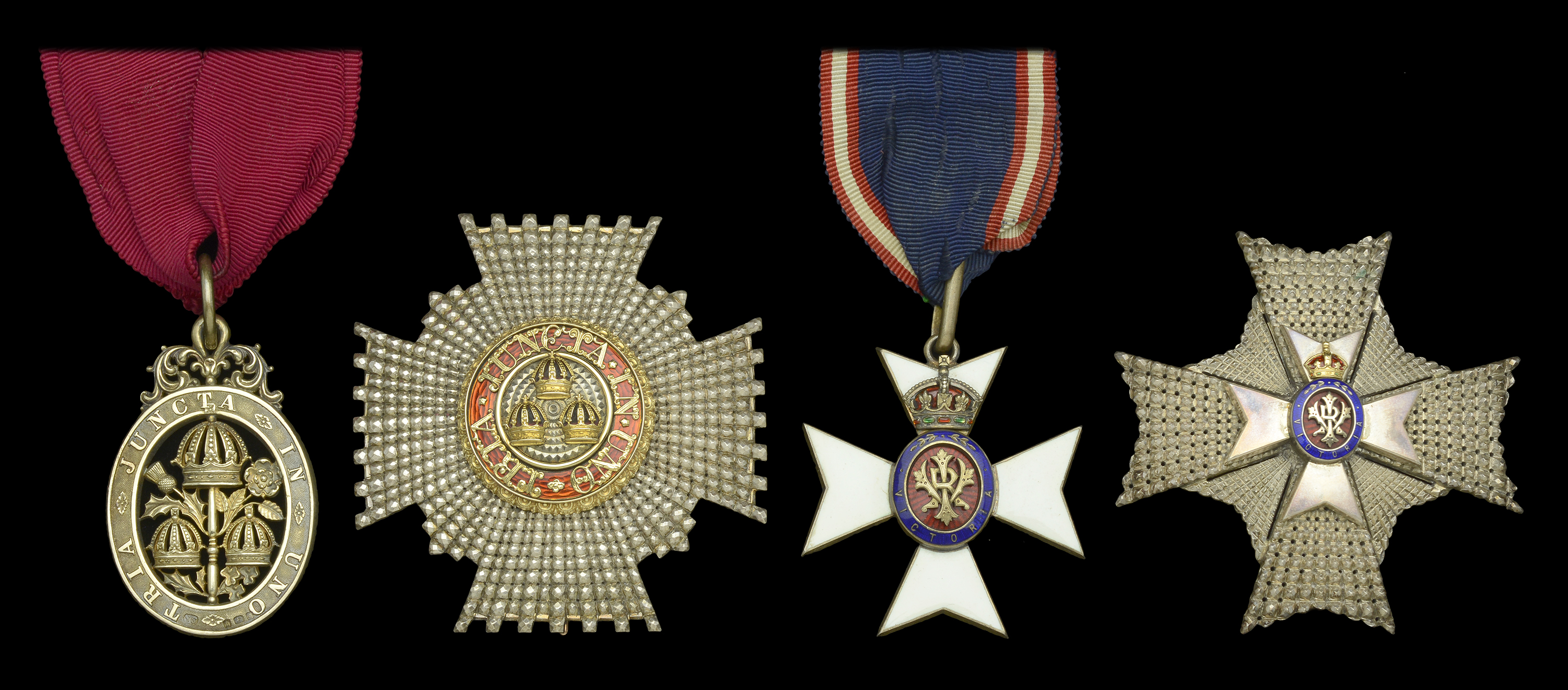The K.C.B. and K.C.V.O. sets of insignia attributed to Sir Ralph Endersby Harwood, who rose from humble beginnings as a G.P.O. Boy to become Financial Secretary to His Majesty King George V at Buckingham Palace The Most Honourable Order of the Bath, K.C.B., (Civil) Knight Commander’s set of insignia, comprising neck badge, silver-gilt, hallmarks for London 1932; and breast star, silver, gold and enamel, with gold retaining pin, with part lengths of neck riband, in Garrard, London, case of issue; The Royal Victorian Order, K.C.V.O., Knight Commander’s set of insignia, comprising neck badge, silver-gilt and enamel, the reverse officially numbered ‘K243’; and breast star, silver, with gilt and enamel centre, with god retaining pin, the reverse officially numbered ‘243’, with full and miniature-width neck ribands, in Collingwood, London, case of issue, with ‘K’ stock sticker, but with the inked number no longer visible, nearly extremely fine and better (4) £1,500-£2,000 --- K.C.B. London Gazette 1 January 1934. K.C.V.O. London Gazette 2 June 1931. Sir Ralph Endersby Harwood was born at Biggleswade, Bedfordshire, on 28 March 1883, the second son of Charles Harwood of Richmond Lodge, Clifton. Educated at Clifton Church of England School and Bedford Modern School, he entered the civil service at 15 years of age and took initial employment as telegraphist at the General Post Office. Furthered by evening classes, he passed the Second Division Examination in 1900, taking 1st place at Bedford School and 16th place of 1,000 candidates across the country. As Second Division clerk he served successively in the India Office, War Office, Board of Inland Revenue and the National Health Insurance Commission; the latter posting witnessed promotion to a Staff Clerkship. Further promotions followed between August 1912 and May 1913, firstly to Assistant Accountant and thence to the coveted Class I of the civil service with the personal post of private secretary to the permanent secretary. Upon the outbreak of the Great War the Insurance Commission was charged with the important duty of controlling the drug supply of the United Kingdom. Lent to the War Trade Department in late 1915, Harwood took on a statistical position which examined the imports of neutral European Nations - a task which was rendered of vital necessity in order to carry out the blockade of Germany by the Royal Navy. Having set this work on a secure foundation, his superiors - led by Lord Robert Cecil, the new ‘Minister for Blockade’ - set about creating a whole new branch with Harwood as Department Controller. With hostilities at an end, Harwood was appointed temporary Deputy Treasurer to King George V in 1922. He transferred briefly to the Treasury, but returned to the Royal Household in the early 1930’s. In 1935 he was appointed to the new and prestigious role of Financial Secretary to the King. According to The News Chronicle of 16 November 1935, the popular appointment was ‘in recognition of his services in securing economies in the royal household during the depression four years ago, when the King reduced his Civil List income by £50,000.’ More pertinently, Harwood managed to achieve the feat without reducing wages or dismissing any royal servant - at the direct request of His Majesty. Harwood retired from the role in 1936 and later became a financial consultant with Messrs. John D. Wood & Co., London. Awarded the C.B.E. in 1918, C.V.O. in 1921, C.B. in 1924, K.C.V.O. in 1931 and K.C.B. in 1934, Harwood retired to Seckford Hall in Suffolk, and died at home on 28 February 1951. Sold with the original Central Chancery bestowal warrant for the Companion (Civil Division) of the Order of the Bath, named to Ralph Endersby Harwood, Esq., C.V.O., C.B.E., dated 3 June 1924; a second bestowal warrant for the Grant of Dignity of a Commander of the Royal Victorian Order, named to Ralph Endersby Harwood Esquire, C.B.E., dated 4 June 1921; with corresponding Buckingham Palace letter relating to the second, dated 28 June 1921; and a further typed letter from the Privy Purse Office, Buckingham Palace, announcing the King’s intention to promote Harwood K.C.V.O. on the occasion of His Majesty’s Birthday, dated 20 May 1931.


